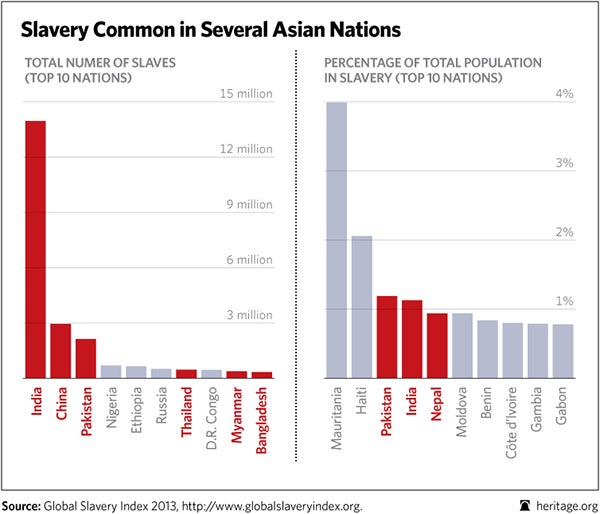Asia Accounts for Two out of Three People Enslaved Worldwide
Olivia Enos /
The recently released Global Slavery Index reveals that there are an estimated 29.8 million people enslaved worldwide. Almost half of the index’s listed top offenders are from Asia.
Mauritania, Haiti, and Pakistan have the highest prevalence of trafficking, but India, China, and Pakistan enslave the highest number of people. And of the 22 million people enslaved in the index’s top 10 countries, over 20 million are from Asia. In terms of sheer quantity of victims, India tops the charts with nearly 14 million people in slavery.
The index measures 162 countries and studies the prevalence of slavery (comparing the number of enslaved people to the total population) and the absolute numbers (total number of people enslaved in the country). The rankings are based on internationally affirmed definitions of slavery that include forced labor, human trafficking, and child marriage.
Another human trafficking resource, the State Department’s Trafficking in Persons (TIP) report, similarly identifies Asia as a major source, transit point, and destination for human trafficking and slavery. The TIP report has placed China and North Korea on Tier 3 for their failure to comply with international human trafficking law and has placed at least eight other Asian nations on the Tier 2 watch list for similar offenses.
The Global Slavery Index and the TIP report results should invoke action. In addition to its key findings, the Global Slavery Index provides recommendations on how the top offending countries can work toward reducing slavering in their own country. Some suggestions include addressing bonded labor and other forms of trafficking, improving the legal framework for handling trafficking victims, and upgrading rehabilitation centers and shelters for victims of slavery.
Despite over a decade of attempts at reducing human trafficking, current policies seem incapable of reducing the prevalence of slavery. While the U.S. should maintain pressure on our friends in Asia to uphold the rights and dignity of their people, it may be time to revisit current policy on human trafficking and slavery.
A team of analysts at The Heritage Foundation is currently producing a new study aimed at improving U.S. efforts to stem human trafficking.

